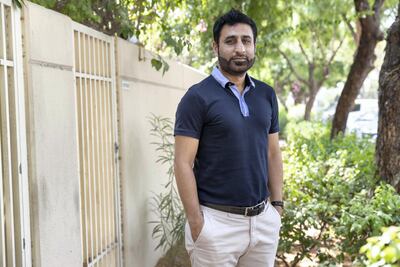When Sumera Hasan wrote to The National's The Debt Panel for help, her aim was to raise awareness of the harassment she was experiencing from a debt collection agency.
Just six weeks later, however, Ms Hasan, a single mother of four, is now free of the Dh90,000 she owed after The National asked her lender to help resolve the case and two generous readers stepped forward to clear the outstanding balance.
Ms Hasan says she can now live without fear of being hounded by collection agents, who sometimes called her up to 10 times a day and even turned up at her office.
"The mental peace is helping a lot. I was not able to sleep until The Debt Panel gave me some hope. Now I am not afraid to pick up my phone," says Ms Hasan, from Pakistan, who supports her mother, a son, 14, daughter, 7 and 5-year-old twins on her Dh16,000 income. "Before, when I saw a new number on my phone I could not concentrate on my work. It was torture day in day out."
Ms Hasan's story, which was last month featured in The Debt Panel – a weekly column that helps readers resolve their chronic debt issues – touched the hearts of readers because she was a single-mother struggling to raise a young family after her husband abandoned her.
She had accumulated debt in 2013 when she took on a loan from National Bank of Abu Dhabi, before it became part of First Abu Dhabi Bank, to finance the birth of her twins. But life took a turn for the worse when she and her husband lost their jobs and then he left her to cope alone.
A spokesperson from FAB said: “FAB supports the growth ambitions of its stakeholders and goes beyond financial products and services, and as such, we are grateful for all customer feedback as we strive to consistently deliver the highest standards of service.”
The National contacted the bank to find out if Ms Hasan's Dh45,000 debts, which had mushroomed to over Dh90,000 due to missed payments and interest charges, could be renegotiated.
The collections team agreed to a settlement figure of Dh25,000 – an amount that was then paid off by two readers who had contacted The National independently to help.
The first, a married father-of-three daughters, from London in the UK, wanted to give back as part of his zakat payment to tie in with the holy month of Ramadan.
“In Islam they say you should cleanse your wealth so 2.5 per cent of what you have in liquid assets should go to the needy," says the donor, who did not want to reveal his name.
The pilot, who has lived in the UAE since 2010, says he felt moved to help after reading Ms Hasan’s plight while waiting at a car wash.
“Her story got worse and worse,” he says. “She was already down in the dumps and then her husband left her. My father is from Pakistan so it tugged on the heartstrings.”
While the donor was able to raise Dh12,000, his mother, who lives in the UK, offered to give him a further Dh7,000 to donate.
The donor had also contacted another reader, Israr Ahmed, an operations manager in the retail sector, about Ms Hasan’s case.
Mr Ahmed, a well-known figure in the Muslim community for his charitable efforts to help those in need, often donates funds to help those struggling with debt.
“I just put the word out into the community that somebody on the doorstep needed a bit of support, and needed to be free of debt,” says Mr Ahmed, also from the UK, who says he has lost count of the number of Muslims he has helped in the 10 years he has been in the UAE.
Mr Ahmed says the final Dh6,000 to clear Ms Hasan’s debt came from "myself, my mother, my brother and a friend".
“In Islam, we believe that charity is something we should be doing; we should not be holding on to our wealth and the needy have a right to our wealth. It helps us keep our feet on the ground,” he says.
Ms Hasan says she does not have the words to describe how grateful she is and feels she now has the “courage to come out of hiding and face the world again”.
"I had become a recluse, hiding from the bank, hiding from the police, shying away from social interactions, keeping a low profile at my workplace in fear of being highlighted, fear that I would have to face embarrassment should the bank staff or police show up at the office," she says. "The contributions have given me the opportunity to put my life back together again."
However, Ms Hasan's case is not an indication that resolving chronic debt is straightforward. She struggled for five years before her case was sorted out and she warns others to avoid taking on credit at all costs.
"Keep your bank borrowings to the minimum" she says. "Ideally keep away from availing any facility from financial institutions. They are not worth the trouble they cause, should circumstances become unfavourable some day."
She is no longer liable to the bank and will have the police case against her dropped. However, because she agreed a settlement rather than clearing the full entire amount, she is not entitled to a clearance letter from the bank. This means she will never be able to borrow again in the UAE.
“This is a blessing in disguise as I would never want to take on any debt again ,” she says. “Because of this nightmare, I never want to be in that kind of situation. It has driven me crazy and I don’t want to be at risk if I lost my job again.”
________
Read more:
The Debt Panel: Single mother of four is being hounded by debt collectors over Dh43,000
It is possible to restructure debt directly with UAE banks, a Sharjah resident reveals how
How an Abu Dhabi resident took three UAE banks to court and cleared Dh700,000 debt
How to file a case against your bank over escalating credit card debt
________
Ms Hasan's problems began in 2013 when she took a Dh30,000 loan to pay for the delivery of her twins. Neither her or her husband’s health insurance included maternity cover, leaving them little option but to borrow to meet the cost.
However, the same year, the couple lost their jobs and, struggling to meet the loan instalments, they ran up Dh15,000 in debt on two credit cards with the same bank. The couple notified the bank of their redundancy and tried to keep up with payments
“I found contractual positions and kept paying whenever I could. So after a break of eight months, I would pay for three or four months and then stop again until I had more work,” says Ms Hasan, who moved to Dubai 12 years ago.
The situation was compounded when the marriage broke down and Ms Hasan’s husband left her, leaving her to support and raise their four children alone. He no longer supports the children and has not had any contact with the family since 2015, when Ms Hasan secured a full-time job as a researcher in July 2015. She hoped her situation would improve but by then her debt had been outsourced by the bank to a collection agency, and agents began turning up at her office.
“I’d informed my company to make them aware of my situation because I had gone through the divorce and I had to process my kids' visas,” she says, adding that her employers were supportive.
“They are like family. They’d say ‘we are with you don’t worry’. One of the partners told me that the agents cannot show up at your office – that’s when I found out about my rights.”
The company involved the police, which is how Ms Hasan found out that the bank had filed a case against her with the police – despite the agency threatening such action.
“They kept saying they would file a case as a pressure tactic, but it turned out they had already done so, “ she says. “They also threatened a travel ban but I have left the country for work a couple of times and there was no ban.”
However, despite earning Dh16,000, Ms Hasan was unable to make any inroads on the debt. She has monthly outgoings of Dh5,000 in rent, Dh6,000 in school fees, Dh2,000 for the school bus, Dh1,800 for groceries and Dh1,200 for general bills.
In February 2017, with the help of friends, she cobbled together funds to make an offer of Dh32,000 to reduce the outstanding balance and escalating interest but the bank demanded the full payment, which Ms Hasan could not make.
________
Read more:
85% of UAE residents still not saving enough for their future: National Bonds
Dubai third most expensive expatriate city in the world, new study says
Personal finance in the UAE: Residents track finances better but struggle with saving and debt
UAE Banks Federation issues financial literacy handbook to reduce chronic indebtedness
________
With the situation unresolved, the stress began to affect her work and home life
“I could not concentrate on my work because the phone kept on ringing," she says. "My children were affected too. The phone calls would come in at home, so my eldest became afraid of the phone ringing.”
Ms Hasan says she received up to 10 calls a day and has 100s of emails from different agencies.
“Each agency seemed to have seven or eight people working on the case and every time they called me I would have to explain the whole situation again to the new person.”
Fearing she may eventually lose her job, she contacted The National in a last-ditch appeal for help.
“I was shocked when I received a reply,” she says. “I just wanted to make people aware of the trouble you can end up in. It gave me hope and the ball started rolling from there.”
Ms Hasan now wants to focus on building up savings to fall back on. She often takes on part-time assignments to supplement her income and has arranged with the school to pay her children’s school fees monthly rather than every term.
“I am surviving on a month-to-month basis and have no buffer but I hope to change that in the future," she says.
Ms Hasan says the experience has taught her to help others as she herself has been helped.
“I want to give back to the community when I am able to in the future. You don’t realise the tough times people are going through – but now, if I hear that someone has lost their job or a family is suffering, I understand.
“What I'm taking away from all of this, as a greater lesson, is that when one person abandons you, God sends an 'extended family' to help you get back on your feet, which is nothing short of a miracle.”
_________
Listen:
Business Extra Podcast: Cost of living in the UAE compared to the rest of the world



